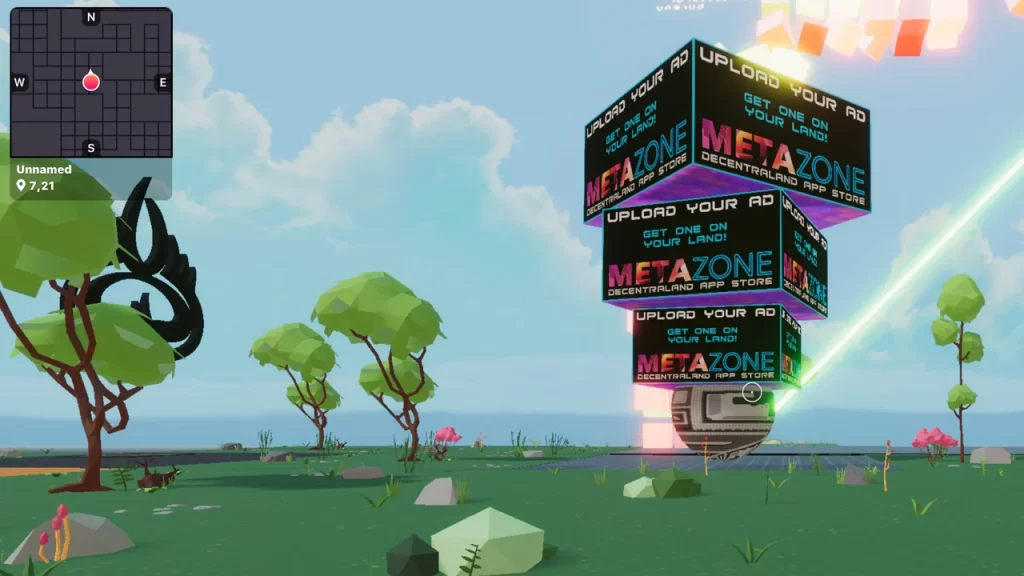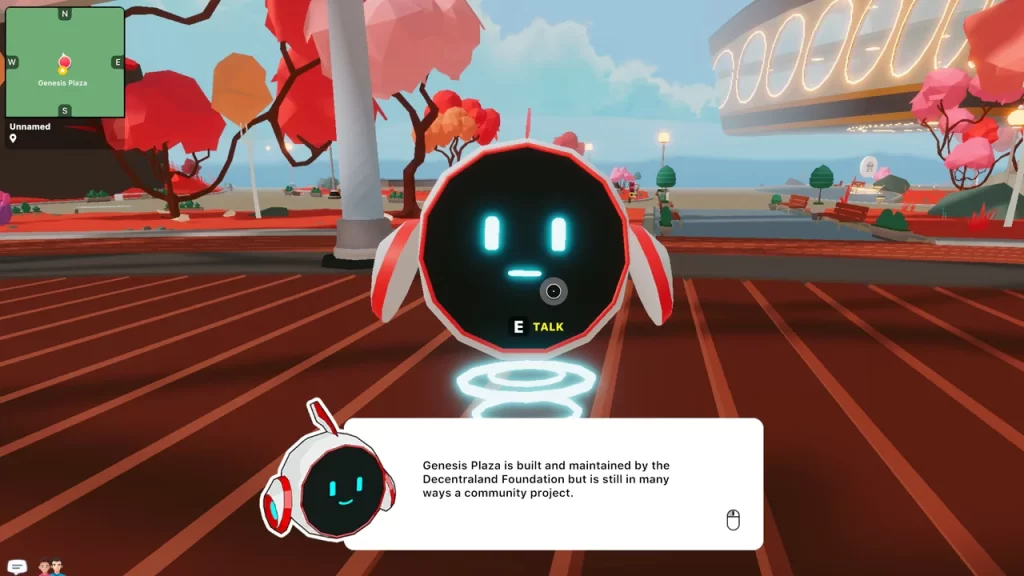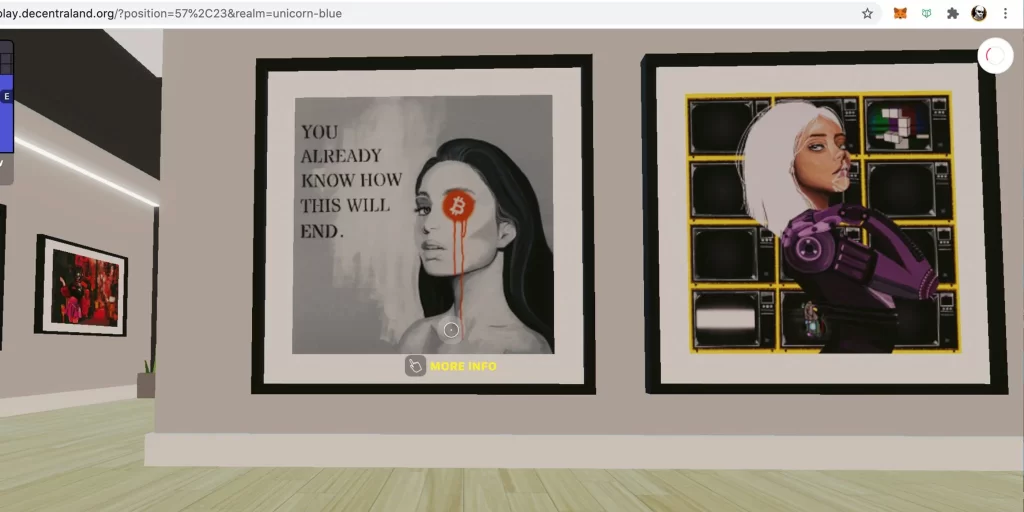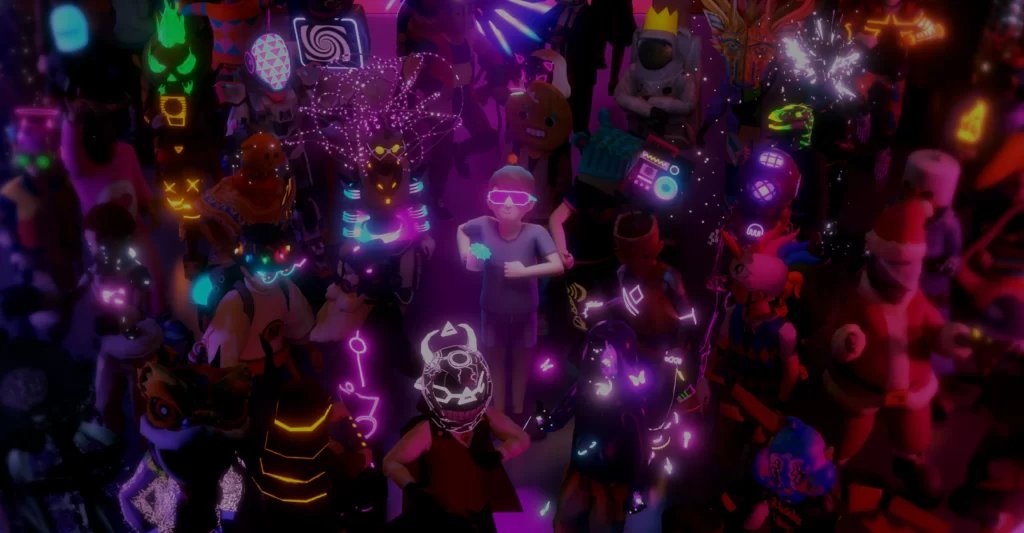Decentraland emerges as a pioneering virtual reality platform underpinned by Ethereum’s blockchain technology. As a beacon in the expanding universe of the metaverse, it offers users a shared digital space where they can explore, interact, and create using the native cryptocurrency, MANA.
This platform distinguishes itself with unique features such as LAND and Estates, digital real estate owned through NFTs, enabling a marketplace for content creators and digital artists. Despite its innovation, Decentraland faces challenges like technical bugs and underpopulated spaces, highlighting the growing pains in blockchain-based gaming.
Focusing on its role in the digital landscape, Decentraland leverages blockchain technology and NFTs to pioneer a decentralized gaming experience. Users can leverage the Decentraland DAO for community governance, employing web3 principles to shape the platform’s future.
As one of the first metaverses to harness the power of the Ethereum blockchain, it sets a precedent for digital identity, ownership, and the ERC-20 token economy, carving a niche for itself amidst a sea of blockchain projects. However, addressing its drawbacks remains crucial for its evolution in the ever-competitive field of digital real estate and virtual worlds.
History and Founders
Decentraland’s inception and evolution are credited to the innovative minds of co-founders Esteban Ordano and Ariel Meilich. Their backgrounds laid a solid foundation for the platform’s development:
- Esteban Ordano: A software engineer from the Instituto Tecnologico de Buenos Aires, Ordano’s career includes pivotal roles at Google and BitPay. His technical expertise and vision for a decentralized virtual world were instrumental in shaping Decentraland.
- Ariel Meilich: With a unique blend of neuroscience and economics from New York University, Meilich’s experience with Bitcoin and blockchain technology complemented Ordano’s skill set, driving the project’s conceptual and strategic direction.
Decentraland’s journey from concept to reality unfolded in distinct stages, showcasing the platform’s growth and refinement:
- 2015 – Stone Age: The initial proof-of-concept phase, highlighting the basic idea.
- Late 2016 – Bronze Age: Introduction of a 3D virtual world on a blockchain.
- Iron Age: Development of more advanced features leading to the current Ethereum-supported platform.
The project’s financial and organizational milestones further underscore its development:
- 2017 ICO: A successful initial coin offering raised $26 million, fueling the platform’s launch.
- February 2020: Decentraland opened to the public, marking a significant step in its journey.
- Late October 2021: Ariel Meilich transitioned to found Big Time Studios, with Esteban Ordano continuing to spearhead brand deals and adoption strategies into 2022.
Managed by the Decentraland Foundation, the platform’s evolution is a testament to its founders’ vision and the community’s ongoing support.

MANA Token: The Currency of Decentraland
In the heart of Decentraland’s virtual economy lies the MANA token, an ERC-20 fungible asset that fuels transactions within this expansive digital realm. As the cornerstone of Decentraland’s marketplace, MANA facilitates the purchase of virtual plots of land, represented as NFTs, alongside a plethora of virtual goods and services. The versatility of MANA extends beyond mere transactions; it embodies the democratic ethos of Decentraland through its integral role in governance.
- Utility and Governance:
- Transactions: Used for buying LAND, Estates, wearables, and other in-game items.
- Voting: MANA holders can influence policy updates, land auctions, and development subsidies via the DAO.
- Value and Accessibility:
- Market Performance: From a humble beginning at less than a dollar, MANA’s value soared to over $5 in October 2021.
- Acquisition: Available on major exchanges like Kraken and Coinbase. Compatible with hardware (e.g., Ledger Nano S/X) and software wallets.
- Community Empowerment:
- Decentraland DAO: A collection of smart contracts where proposals are voted on by MANA holders.
- Voting Power: Determined by the combination of MANA, LAND, and Estates balances. Each LAND grants an equivalent of 2000 MANA in voting units.
Despite its innovative approach to virtual ownership and governance, Decentraland’s reliance on MANA exposes users to the volatile nature of cryptocurrency markets, which can affect the accessibility and stability of in-world assets.

Owning and Trading LAND in Decentraland
In the virtual world of Decentraland, owning and trading LAND is a cornerstone of the platform’s digital economy. LAND and Estate, represented as non-fungible (ERC-721) tokens, are virtual plots of digital real estate that users can buy, sell, and develop, creating a vibrant marketplace for virtual assets.
- Acquisition and Trading:
- Marketplace Dynamics: Users can engage in transactions through Decentraland’s Marketplace or OpenSea, purchasing LAND with MANA, Decentraland’s native cryptocurrency. The process involves selecting a parcel, placing a bid or purchasing at the asking price, and linking a cryptocurrency wallet to complete the transaction.
- Factors Influencing LAND Value: Location, proximity to popular districts, and the size of the plot significantly affect LAND prices. Notably, the Genesis Plaza and areas close to roads or communities are highly sought after, mirroring real-world real estate dynamics.
- Significant Transactions:
- Record Sales: The digital real estate market has seen remarkable transactions, including a plot selling for just under $1 million and The Metaverse Group’s acquisition of a virtual plot for $2.43 million. These high-profile sales underscore the potential profitability of investing in Decentraland’s digital land.
Despite the opportunities, a drawback to consider is the volatile nature of cryptocurrency markets, which can impact LAND prices and accessibility. This volatility requires users to stay informed and consider the long-term implications of their investments in the digital property market.If you are interested in digital assets, you want to take advantage of our review of this innovative platform.
Key Features and Technologies
Decentraland’s innovative architecture is built upon a three-layer protocol designed to enhance user experience and interaction within its virtual world. This structure includes:
- Consensus Layer: This foundational layer ensures all transactions and land ownership are securely recorded on the Ethereum blockchain. It acts as the backbone of Decentraland, providing a decentralized and immutable registry for digital property.
- Content Layer: Central to Decentraland’s immersive experience, this layer facilitates the storage and distribution of content across the virtual world. It allows users to create, upload, and manage 3D scenes, interactive experiences, and other digital assets, making the metaverse a rich tapestry of user-generated content.
- Real-time Layer: Enabling live interactions among users, this layer supports communication, avatar movements, and other real-time activities within Decentraland. It is pivotal for community engagement, events, and social experiences, fostering a dynamic and interactive virtual environment.
Despite its groundbreaking technology and potential for creating a decentralized utopia, Decentraland has faced criticism for technical bugs and a mostly empty virtual world. Addressing these challenges is crucial for enhancing user engagement and realizing the platform’s full potential. As Decentraland continues to evolve, with recent updates focusing on usability and performance, the community’s role in development and governance remains a testament to its decentralized ethos, promising a future where users shape the metaverse.

Community and Governance with the Decentraland DAO
In the dynamic world of Decentraland, the Decentraland Foundation, a non-profit entity, plays a pivotal role in overseeing the platform’s operations. However, the true essence of governance within this virtual realm is encapsulated by the Decentraland DAO (Decentralized Autonomous Organization).
This innovative governance model empowers MANA, LAND, and Estate holders with the authority to shape the platform’s future, ensuring that Decentraland is not tethered to a centralized entity but is steered by its community. The governance process is facilitated through wrapped MANA (wMANA), LAND, and Estate tokens, which are needed for voting on changes to the protocol.
- Governance Structure:
- Decentraland DAO: Operates on blockchain technology, owning critical smart contracts and assets like the LAND and Estates Contract, and the Marketplace.
- Security Advisory Board (SAB): Comprising 5 Solidity experts, it ensures the security of smart contracts and reviews governance proposals.
- Committees and Squads: Including the Wearables Curation Committee and the Grants Support Squad, these groups focus on specific governance aspects like reviewing wearables and supporting grantees.
Despite the robust governance framework, a notable drawback is the potential complexity and technical barriers for new users engaging with the DAO. This could lead to lower participation rates among community members unfamiliar with DAOs or blockchain technology. Additionally, the reliance on a liquid democracy model, where users can delegate their voting power, might concentrate decision-making power among a few, potentially sidelining the broader community’s voice. The Decentraland DAO, while pioneering, faces the challenge of ensuring inclusive and equitable governance in the ever-evolving landscape of the metaverse.

FAQs
What are the drawbacks of investing in Decentraland?
The speaker rated Decentraland with a modest three out of five stars, citing a lack of robust fundamentals and a discouraging price trend, with a decline of 93% from its peak value. Additionally, Decentraland’s status as an ERC20 token means that investors might face high transaction fees during periods of increased Ethereum network congestion.
Can we expect the value of Decentraland’s MANA token to increase in the future?
The current price of Decentraland’s MANA token is $0.74 USD. Projections suggest that the price of MANA is expected to rise by 8.95%, potentially reaching $0.863950 by March 13, 2024, indicating a positive outlook for its future value.
Is Decentraland a secure option for investors?
Decentraland is considered a highly speculative investment, similar to many other smaller cryptocurrencies. While it offers the potential for gains, it also carries a significant risk of loss. For instance, an early investment in the token at the beginning of 2021 at $0.08 could have yielded a considerable return, demonstrating its volatility.
What is the long-term potential of Decentraland?
Our projections for Decentraland’s MANA token are optimistic, with an anticipated price peak of $1.31 by the end of 2024. Given the expected growth of the metaverse, MANA is considered to be a profitable long-term investment.
Is Decentraland the metaverse?
It’s not THE metaverse, but it is a metaverse game.
Wrapping Up
Decentraland, a revolutionary platform built upon Ethereum’s blockchain, has undeniably paved the way for a new era of virtual reality. The combined use of MANA, LAND, and Estates, backed by an innovative DAO for governance, underlines a unique approach to digital real estate and community engagement.
Yet, challenges such as technical glitches and sparsely populated areas within the vast digital landscape point towards the need for continuous development and inclusivity, emphasizing that the path to a fully immersive metaverse is a work in progress. The dual-edged sword of using cryptocurrency, while enabling unparalleled decentralization and user autonomy, also exposes participants to the volatility inherent in digital markets, underscoring a significant drawback that warrants attention as the platform evolves.
As we look towards the future, the implications of Decentraland’s success extend far beyond its digital borders, hinting at the potential reshaping of social interactions, digital ownership, and community-driven governance in ways yet to be fully realized. The active role of the Decentraland community, in partnership with its founders and the Decentraland Foundation, suggests a collaborative path forward, one that is likely to influence the trajectory of virtual worlds significantly.
The continued refinement of technical aspects, combined with efforts to bolster user engagement and address the platform’s limitations, will be crucial in determining Decentraland’s role in the broader narrative of the metaverse. The journey of Decentraland stands as a testament to the hidden potential of blockchain technology to create decentralized, user-governed spaces, marking a pivotal chapter in the evolution of virtual reality.





